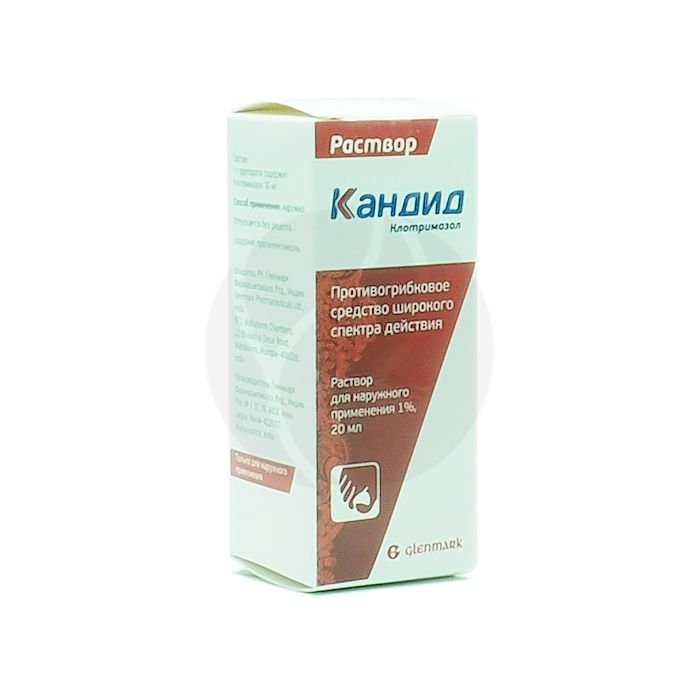Candide solution for outside. approx. 1%, 20ml
Expiration Date: 11/2025
Russian Pharmacy name:
Кандид раствор д/наруж. прим. 1%, 20мл
Fungal diseases of the skin, mycoses of skin folds, feet;
pityriasis versicolor, erythrasma, superficial candidiasis caused by dermatophytes, yeasts (including the genus Candida), molds and other fungi and pathogens sensitive to clotrimazole;
mycoses complicated by secondary pyoderma.
Outwardly. The solution is applied in a thin layer 2 times a day on previously cleaned (using soap with a neutral pH value) and dried affected skin areas. The duration of treatment depends on the severity of the disease, the localization of pathological changes and the effectiveness of therapy. Treatment of dermatomycosis is carried out for at least 4 weeks, pityriasis lichen - 1-3 weeks. In case of fungal diseases of the skin of the legs, therapy is recommended to continue for at least 2 weeks after the symptoms of the disease are eliminated.
Solution for external use in the form of a clear, colorless, viscous liquid.
1 ml
clotrimazole 10 mg
Excipients: propylene glycol - 990 mg.
Hypersensitivity to clotrimazole or other components of the drug (propylene glycol, polyethylene glycol, isopropyl alcohol);
I trimester of pregnancy.
With care: lactation period.
pharmachologic effect
Broad-spectrum antifungal agent for external use. The action of clotrimazole is associated with a violation of the synthesis of ergosterol, which is part of the cell membrane of fungi, which changes the permeability of the cytoplasmic membrane and causes subsequent cell lysis. In small concentrations it acts fungistatically, in large concentrations it is fungicidal, and not only on proliferating cells. In fungicidal concentrations, it interacts with mitochondrial and peroxidase enzymes, resulting in an increase in the concentration of hydrogen peroxide to a toxic level, which also contributes to the destruction of fungal cells.
Clotrimazole exhibits fungicidal and fungistatic activity against dermatomycetes (Trichophyton rubrum, Trichophyton mentagrophytes, Epidermophyton floccosum, Microsporum canis), yeast-like and mold fungi (Candida spp., Including Candida spp., Including Candida Rusta albicans; Torulopsis albicans; Torulopsis genus, Torulopsis albicans; Active against the causative agent of varicoloured lichen - Pityrosporum orbiculare (Malasseziafurfur). Effective against gram-positive bacteria - the causative agent of erythrasma Corynebacterium minutissimum, as well as Staphylococcus spp., Streptococcus spp., Gram-negative bacteria - Bacteroides, Gardnerella vaginalis. In high concentrations, it is active against Trichomonas vaginalis.
Does not affect lactobacilli. Primarily resistant variants of sensitive fungi are very rare; the development of secondary resistance in sensitive fungi is also observed in exceptional cases under therapeutic conditions.
Pharmacokinetics
When applied externally, after applying clotrimazole to intact or inflamed skin, it is poorly absorbed through the skin and practically does not have a systemic effect. Cmax of clotrimazole in blood serum was below the detection limit of 0.001 ?g / ml.
Side effect
From the immune system: allergic reactions, incl. urticaria, shortness of breath, arterial hypotension, fainting.
Skin and subcutaneous tissue disorders: rash, itching, blisters, peeling, pain / discomfort, swelling, burning, irritation, erythema, tingling.
Application during pregnancy and lactation
Use is contraindicated in the first trimester of pregnancy. Application in the II-III trimesters of pregnancy is possible only in cases where the intended benefit to the mother outweighs the potential risk to the fetus.
If necessary, use during lactation should decide on the termination of breastfeeding.
Application for violations of liver function
In patients with hepatic impairment, the functional state of the liver should be monitored periodically.
Application in children
It is possible to use in children according to indications, in doses and dosage forms recommended according to age. It is necessary to strictly follow the instructions in the instructions for clotrimazole preparations for the use in children of different ages of specific dosage forms of clotrimazole and for contraindications for specific age groups in this category of patients.
special instructions
If allergic reactions or irritation occurs at the site of application of the product, treatment is stopped.
Hygiene rules should be followed to prevent reinfection.
Application of clotrimazole to the skin around the eyes is not recommended.
If clinical signs of infection persist after completion of treatment, a second microbiological study should be performed to confirm the diagnosis.
Drug interactions
With simultaneous use with amphotericin B, nystatin, the activity of clotrimazole decreases.
The simultaneous use of intravaginal clotrimazole and oral tacrolimus, sirolimus can lead to an increase in the concentration of the latter in the blood plasma, therefore, patients should be monitored for the development of symptoms of their overdose, if necessary, with the measurement of plasma concentrations.

